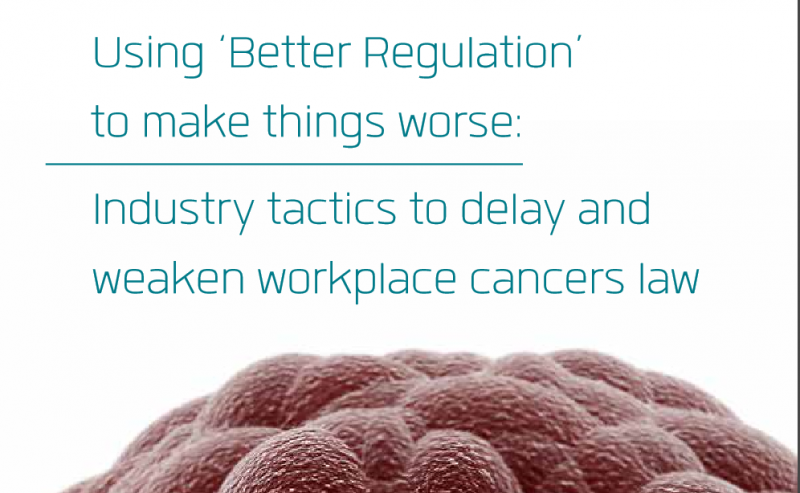
Industry fights EU on employee protection despite 100.000 workplace-related cancer deaths a year, CEO report shows
While cancer research and treatments are ever advancing, industry lobbying against better protection from workplace-related cancers has been intense, as a new report by Corporate Europe Observatory shows.
In the EU alone, over 100,000 people a year die due to insufficient protection against cancer-causing substances in the workplace, making the industries’ fight against stricter EU regulation of these carcinogens a severe threat to public health.
Using ‘Better Regulation’ to make things worse shows how industry lobbies frame employee protection against work-related cancers as an ‘unnecessary’ burden on companies, and explains which tactics they use to hollow out the EU’s revision of the Carcinogens and Mutagens Directive.
The analysis of numerous internal European Commission documents released in response to Corporate Europe Observatory's access to documents requests reveals the ways in which industry is using the rhetoric and tools of the Commission’s ‘Better Regulation’ agenda to pre-empt, delay, and weaken rules that are urgently needed to address occupational cancer rates.
The lobby language of ‘simplification’, ‘burden reduction’, and ‘harmonisation’ has been well received by a European Commission that is keen to cut red tape. But as a result, its proposal for the revision of the Carcinogens Directive only contains exposure limits for a small number of workplace carcinogens, and even those limits are set far too high to effectively protect workers from serious health hazards.
As the European Parliament is now starting discussions on amending the Commission proposal, however, there remains an opportunity – and an obligation – for parliamentarians to put workers’ lives before industry profits.
Researcher Rachel Tansey, who authored the report for Corporate Europe Observatory, said:
“The idea that industry profit margins could ever be used to justify workers’ exposure to cancer-causing substances is a huge injustice, and one that costs thousands of lives every year.
“But industry lobbies still argue that enforceable exposure limits on workplace carcinogens like silica dust would dent their competitiveness – they claim ‘voluntary’ initiatives are enough. Since the costs of occupational cancers are burdened onto the victims and society, industry has little incentive to act. So that is why we need strong rules.
“Thankfully, the European Parliament still has the chance to improve the Commission’s proposal on the revision of the Carcinogens Directive, and give priority to the health of workers over employers’ profits.”
Notes to Editors
- Read the executive summary of the report.
- Read the report in full.
- This piece of research is based on the analysis of numerous internal Commission documents, including correspondence between industry lobbies and the institution, as well as minutes from closed-door meetings, which were released to Corporate Europe Observatory in response to access to documents requests.
- Until Wednesday, 14 December 2016, members of the European Parliament were able to submit amendments to the European Commission proposal for the revision of the Carcinogens and Mutagens Directive. On 28 February 2017, the Parliament’s Employment and Social Affairs (EMPL) committee is expected to vote on the proposal. The Commission is expected to publish an additional list of 12 substances to be included in the directive by the end of 2016.
Contact details
Olivier Hoedeman, olivier@corporateeurope.org, +32 289 309 3001
